What the last Nuremberg prosecutor alive wants the world to know
At 97, Ben Ferencz is the last Nuremberg prosecutor alive and he has a far-reaching message for today’s world
- Twenty-two SS officers responsible for the deaths of 1M+ people would never have been brought to justice were it not for Ben Ferencz.
- The officers were part of units called Einsatzgruppen, or action groups. Their job was to follow the German army as it invaded the Soviet Union in 1941 and kill Communists, Gypsies and Jews.
- Ferencz believes "war makes murderers out of otherwise decent people" and has spent his life working to deter war and war crimes.
Ben Ferencz
CBS NEWS
It is not often you get the chance to meet a man who holds a place in history like Ben Ferencz. He's 97 years old, barely 5 feet tall, and he served as prosecutor of what's been called the biggest murder trial ever. The courtroom was Nuremberg; the crime, genocide; the defendants, a group of German SS officers accused of committing the largest number of Nazi killings outside the concentration camps -- more than a million men, women, and children shot down in their own towns and villages in cold blood.
Ferencz is the last Nuremberg prosecutor alive today. But he isn't content just to be part of 20th century history -- he believes he has something important to offer the world right now.
"If it's naive to want peace instead of war, let 'em make sure they say I'm naive. Because I want peace instead of war."
Lesley Stahl: You know, you-- have seen the ugliest side of humanity.
Benjamin Ferencz: Yes.
Lesley Stahl: You've really seen evil. And look at you. You're the sunniest man I've ever met. The most optimistic.
27-year-old Ben Ferencz became the chief prosecutor of 22 Einsatzgruppen commanders at Nuremberg.
Benjamin Ferencz: You oughta get some more friends.
Watching Ben Ferencz during his daily swim, his gym workout and his morning push-up regimen is to realize he isn't just the sunniest man we've ever met -- he may also be the fittest. And that's just the beginning.
This is Ferencz making his opening statement in the Nuremberg courtroom 70 years ago.
Ben Ferencz in court: The charges we have brought accuse the defendants of having committed crimes against humanity.
The Nuremberg trials after World War II were historic -- the first international war crimes tribunals ever held. Hitler's top lieutenants were prosecuted first. Then a series of subsequent trials were mounted against other Nazi leaders, including 22 SS officers responsible for killing more than a million people -- not in concentration camps -- but in towns and villages across Eastern Europe. They would never have been brought to justice were it not for Ben Ferencz.
Lesley Stahl: You look so young.
Benjamin Ferencz: I was so young. I was 27 years old.
Lesley Stahl: Had you prosecuted trials before?
Benjamin Ferencz: Never in my life. I don't—
Lesley Stahl: Come on.
Benjamin Ferencz: --recall if I'd ever been in a courtroom actually.
Ferencz had immigrated to the U.S. as a baby, the son of poor Jewish parents from a small town in Romania. He grew up in a tough New York City neighborhood where his father found work as a janitor.
Ben Ferencz, 1946.
Benjamin Ferencz: When I was taken to school at the age of seven, I couldn't speak English-- spoke Yiddish at home. And I was very small. And so they wouldn't let me in.
Lesley Stahl: So you didn't speak English 'til you were eight?
Benjamin Ferencz: That's correct.
Lesley Stahl: Could you read?
Benjamin Ferencz: No, on the contrary. The silent movies always had writing on it. And I would ask my father, "Wazukas," in Yiddish, "What does it say? What does it say?" He couldn't read it, either.
But Ferencz learned quickly. He became the first in his family to go to college, then got a scholarship to Harvard Law School. But during his first semester, the Japanese bombed Pearl Harbor, and he, like many classmates, raced to enlist. He wanted to be a pilot, but the Army Air Corps wouldn't take him.
Benjamin Ferencz: They said, "No, you're too short. Your legs won't reach the pedals." The Marines, they just looked at me and said, "Forget it, kid."
So he finished at Harvard then enlisted as a private in the Army. Part of an artillery battalion, he landed on the beach at Normandy and fought in the Battle of the Bulge. Toward the end of the war, because of his legal training, he was transferred to a brand new unit in General Patton's Third Army, created to investigate war crimes. As U.S. forces liberated concentration camps, his job was to rush in and gather evidence. Ferencz told us he is still haunted by the things he saw. And the stories he heard in those camps.
Benjamin Ferencz: A father who, his son told me the story. The father had died just as we were entering the camp. And the father had routinely saved a piece of his bread for his son, and he kept it under his arm at… He kept it under his arm at night so the other inmates wouldn't steal it, you know. So you see these human stories which are not -- they're not real. They're not real. But they were real.
Ferencz came home, married his childhood sweetheart and vowed never to set foot in Germany again. But that didn't last long. General Telford Taylor, in charge of the Nuremberg trials, asked him to direct a team of researchers in Berlin, one of whom found a cache of top-secret documents in the ruins of the German foreign ministry.
Benjamin Ferencz: He gave me a bunch of binders, four binders. And these were daily reports from the Eastern Front-- which unit entered which town, how many people they killed. It was classified, so many Jews, so many gypsies, so many others--
Ferencz had stumbled upon reports sent back to headquarters by secret SS units called Einsatzgruppen, or action groups. Their job had been to follow the German army as it invaded the Soviet Union in 1941, and kill Communists, Gypsies and especially Jews.
Screenshot from film showing the Einsatzgruppen at work.
Benjamin Ferencz: They were 3,000 SS officers trained for the purpose, and directed to kill without pity or remorse, every single Jewish man, woman, and child they could lay their hands on.
Lesley Stahl: So they went right in after the troops?
Benjamin Ferencz: That was their assignment, come in behind the troop, round up the Jews, kill 'em all.
Only one piece of film is known to exist of the Einsatzgruppen at work. It isn't easy viewing…
Benjamin Ferencz: Well, this is typical operation. Well, see here, this-- they rounded 'em up. They all have already tags on 'em. And they're chasing them.
Lesley Stahl: They're making them run to their own death?
Benjamin Ferencz: Yes. Yes. There's the rabbi coming along there. Just put 'em in the ditch. Shoot 'em there. You know, kick 'em in.
Lesley Stahl: Oh, my God. Oh, my God.
This footage came to light years later. At the time, Ferencz just had the documents, and he started adding up the numbers.
Benjamin Ferencz: When I reached over a million people murdered that way, over a million people, that's more people than you've ever seen in your life, I took a sample. I got on the next plane, flew from Berlin down to Nuremberg, and I said to Taylor, "General, we've gotta put on a new trial."
Ben Ferencz entered into evidence the defendants' own reports of what they'd done.
But the trials were already underway, and prosecution staff was stretched thin. Taylor told Ferencz adding another trial was impossible.
Benjamin Ferencz: And I start screaming. I said, "Look. I've got here mass murder, mass murder on an unparalleled scale." And he said, "Can you do this in addition to your other work?" And I said, "Sure." He said, "OK. So you do it."
And that's how 27-year-old Ben Ferencz became the chief prosecutor of 22 Einsatzgruppen commanders at trial number 9 at Nuremberg.
Judge: How do you plead to this indictment, guilty or not guilty?
Defendant: Nicht schuldig.
Benjamin Ferencz: Standard routine, nicht schuldig. Not guilty.
Judge: Guilty or not guilty?
Defendant: Nicht schuldig.
Lesley Stahl: They all say not guilty.
Benjamin Ferencz: Same thing, not guilty.
Otto Ohlendorf
But Ferencz knew they were guilty and could prove it. Without calling a single witness, he entered into evidence the defendants' own reports of what they'd done. Exhibit 111: "In the last 10 weeks, we have liquidated around 55,000 Jews." Exhibit 179, from Kiev in 1941: "The city's Jews were ordered to present themselves… about 34,000 reported, including women and children. After they had been made to give up their clothing and valuables, all of them were killed, which took several days." Exhibit 84, from Einsatzgruppen D in March of 1942: Total number executed so far: 91,678. Einsatzgruppen D was the unit of Ferencz's lead defendant Otto Ohlendorf. He didn't deny the killings -- he had the gall to claim they were done in self-defense.
Benjamin Ferencz: He was not ashamed of that. He was proud of that. He was carrying out his government's instructions.
Lesley Stahl: How did you not hit him?
Benjamin Ferencz: There was only one time I wanted to-- really. One of these-- my defendants said-- He gets up, and he says, "[GERMAN]," which is, "What? The Jews were shot? I hear it here for the first time." Boy, I felt if I'd had a bayonet I woulda jumped over the thing, and put a bayonet right through one ear, and let it come out the other. You know? You know?
Lesley Stahl: Yeah.
Benjamin Ferencz: That son of a bitch.
Lesley Stahl: And you had his name down on a piece of—
Benjamin Ferencz: And I've got-- I've got his reports of how many he killed. You know? Innocent lamb.
Lesley Stahl: Did you look at the defendants' faces?
60 Minutes correspondent Lesley Stahl and Nuremberg prosecutor Ben Ferencz
CBS NEWS
Benjamin Ferencz: Defendants' face were blank, all the time. Defendants-- absolutely blank. They could-- like, they're waiting for a bus.
Lesley Stahl: What was going on inside of you?
Benjamin Ferencz: Of me?
Lesley Stahl: Yeah.
Benjamin Ferencz: I'm still churning.
Lesley Stahl: To this minute?
Benjamin Ferencz: I'm still churning.
All 22 defendants were found guilty, and four of them, including Ohlendorf, were hanged. Ferencz says his goal from the beginning was to affirm the rule of law and deter similar crimes from ever being committed again.
Lesley Stahl: Did you meet a lot of people who perpetrated war crimes who would otherwise in your opinion have been just a normal, upstanding citizen?
"War makes murderers out of otherwise decent people. All wars, and all decent people."
Benjamin Ferencz: Of course, is my answer. These men would never have been murderers had it not been for the war. These were people who could quote Goethe, who loved Wagner, who were polite--
Lesley Stahl: What turns a man into a savage beast like that?
Benjamin Ferencz: He's not a savage. He's an intelligent, patriotic human being.
Lesley Stahl: He's a savage when he does the murder though.
Benjamin Ferencz: No. He's a patriotic human being acting in the interest of his country, in his mind.
Lesley Stahl: You don't think they turn into savages even for the act?
Benjamin Ferencz: Do you think the man who dropped the nuclear bomb on Hiroshima was a savage? Now I will tell you something very profound, which I have learned after many years. War makes murderers out of otherwise decent people. All wars, and all decent people.
So Ferencz has spent the rest of his life trying to deter war and war crimes by establishing an international court – like Nuremburg. He scored a victory when the international criminal court in The Hague was created in 1998. He delivered the closing argument in the court's first case.
"If they tell me they want war instead of peace, I don't say they're naive, I say they're stupid."
Lesley Stahl: Now, you've been at this for 50 years, if not more. We've had genocide since then.
Benjamin Ferencz: Yes.
Lesley Stahl: In Cambodia—
Benjamin Ferencz: Going on right this minute, yes.
Lesley Stahl: Going on right this minute in Sudan.
Benjamin Ferencz: Yes.
Lesley Stahl: We've had Rwanda, we've had Bosnia. You're not getting very far.
Benjamin Ferencz: Well, don't say that. People get discouraged. They should remember, from me, it takes courage not to be discouraged.
Lesley Stahl: Did anybody ever say that you're naive?
Benjamin Ferencz: Of course. Some people say I'm crazy.
Lesley Stahl: Are you naive here?
Benjamin Ferencz: Well, if it's naive to want peace instead of war, let 'em make sure they say I'm naive. Because I want peace instead of war. If they tell me they want war instead of peace, I don't say they're naive, I say they're stupid. Stupid to an incredible degree to send young people out to kill other young people they don't even know, who never did anybody any harm, never harmed them. That is the current system. I am naive? That's insane.
Ferencz is legendary in the world of international law, and he's still at it. He never stops pushing his message and he's donating his life savings to a Genocide Prevention Initiative at the Holocaust Museum. He says he's grateful for the life he's lived in this country, and it's his turn to give back.
Lesley Stahl: You are such an idealist.
Benjamin Ferencz: I don't think I'm an idealist. I'm a realist. And I see the progress. The progress has been remarkable. Look at the emancipation of woman in my lifetime. You're sitting here as a female. Look what's happened to the same-sex marriages. To tell somebody a man can become a woman, a woman can become a man, and a man can marry a man, they would have said, "You're crazy." But it's a reality today. So the world is changing. And you shouldn't-- you know-- be despairing because it's never happened before. Nothing new ever happened before.
Lesley Stahl: Ben—
Benjamin Ferencz: We're on a roll.
Lesley Stahl: I can't—
Benjamin Ferencz: We're marching forward.
Lesley Stahl: Ben? I'm sitting here listening to you. And you're very wise. And you're full of energy and passion. And I can't believe you're 97 years old.
Benjamin Ferencz: Well, I'm still a young man.
Lesley Stahl: Clearly, clearly.
Benjamin Ferencz: And I'm still in there fighting. And you know what keeps me going? I know I'm right.
Produced by Shari Finkelstein and Nieves Zuberbühler.
© 2017 CBS Interactive Inc. All Rights Reserved.
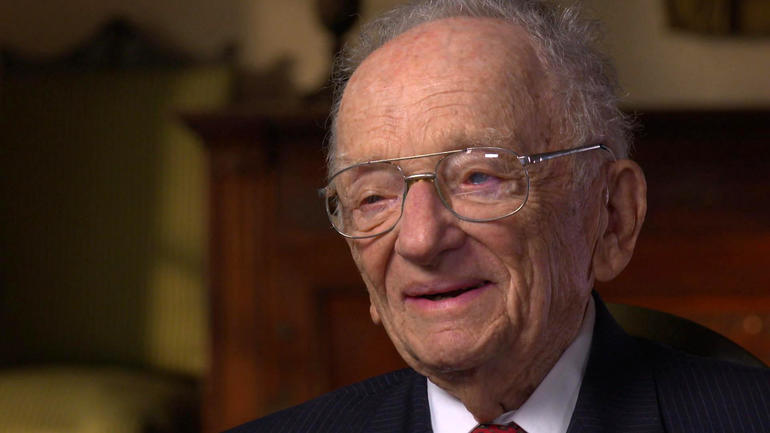
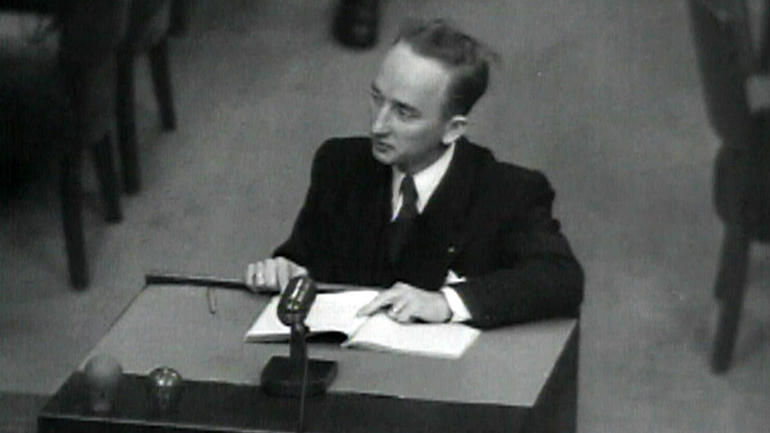
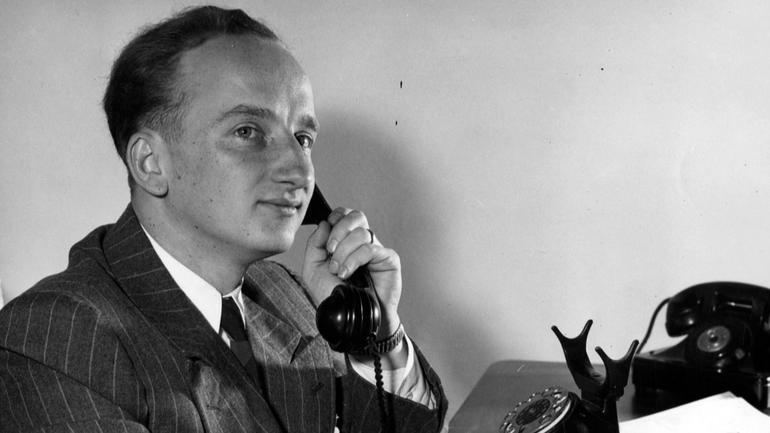
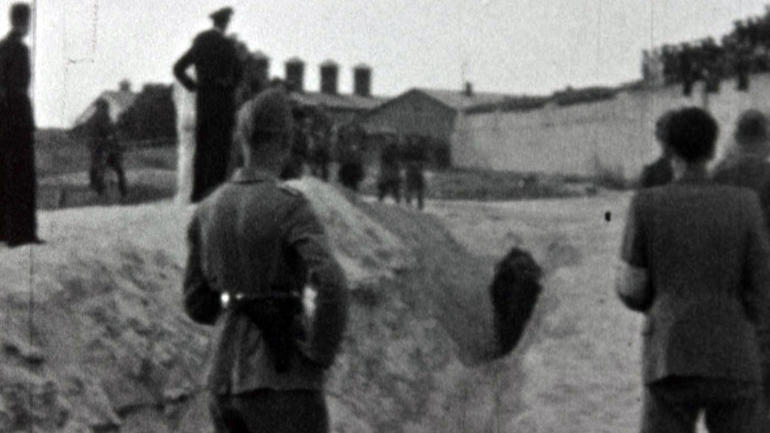
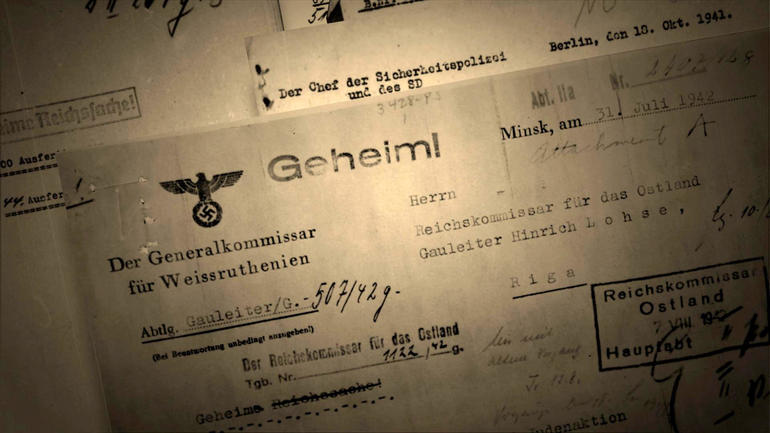
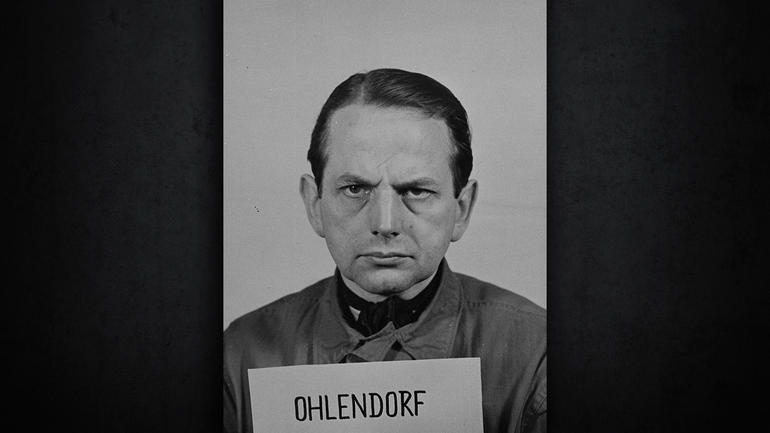
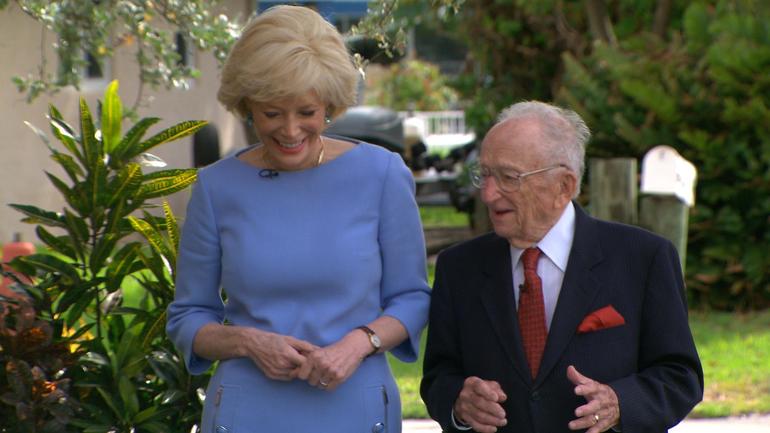






Geen opmerkingen:
Een reactie posten